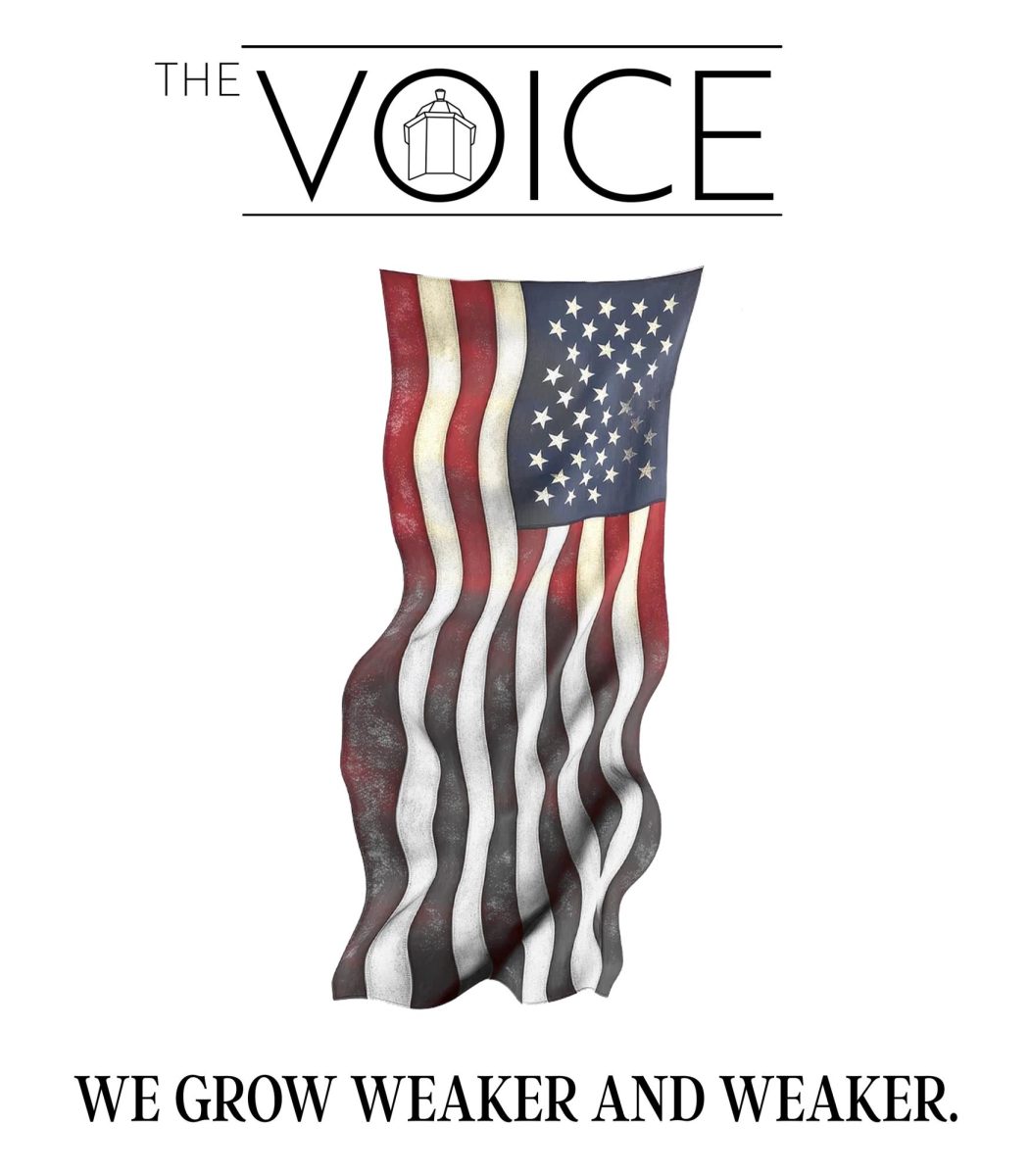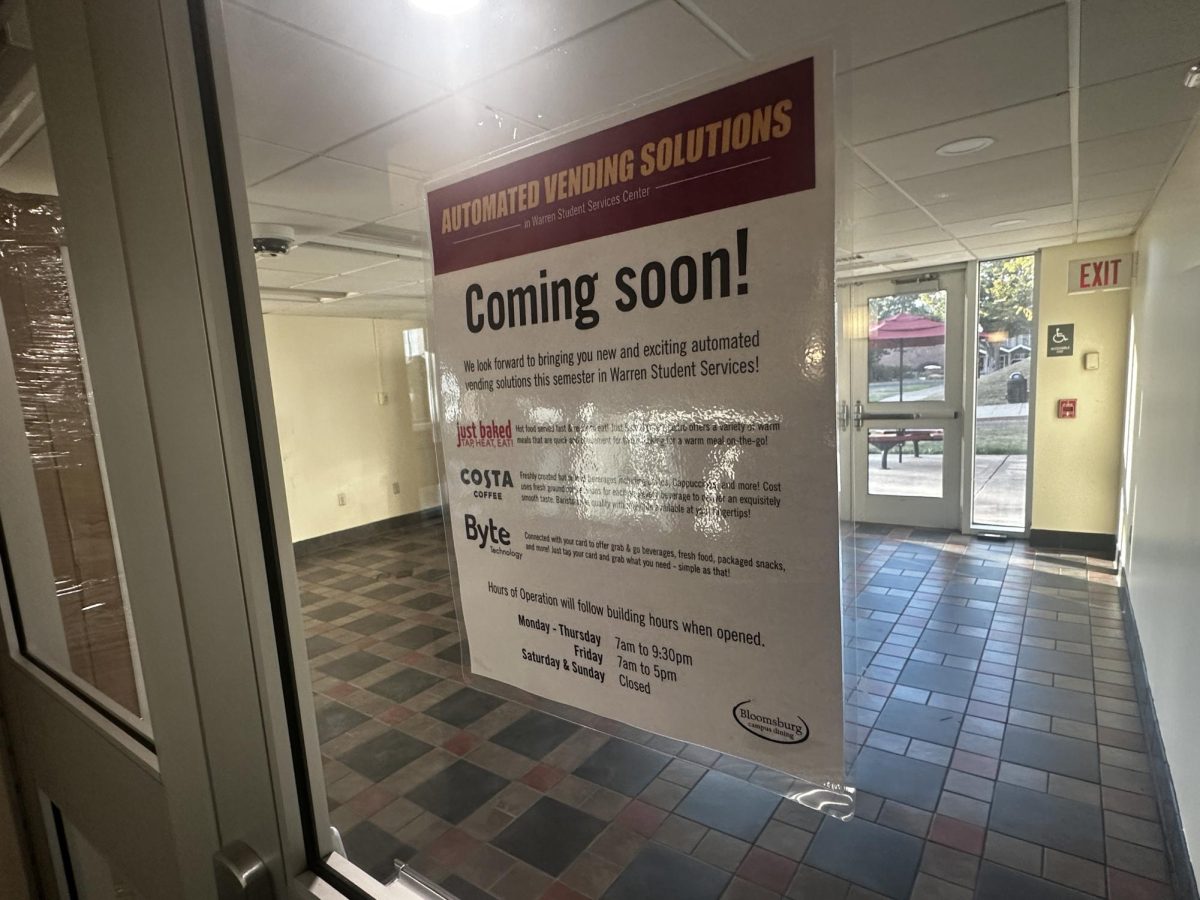The internationally-renowned vocal band Six Appeal hit all the right notes with an eclectic set in Carver Hall last Friday.
It was an evening of aca-awesomeness punctuated with hilarious comedy, led by baritone Trenard Jones, mid-tenor Michael Brookens, bass Reuben Hushagen, vocal percussionist Andrew Berkowitz, low tenor Jonathan Thalmann and high tenor Jordan Roll. The guys kept the song and dance going for over an hour and a half, starting with Disney staple “The Circle of Life” and segueing into Prince’s “Kiss.”
Their vocal journey spanned several decades of music, including the Goo Goo Dolls’ “Iris,” Michael Jackson’s “Billie Jean” and the immortal “I Will Survive” by Gloria Gaynor for the show-closer.
The Voice spoke with the six-man ensemble about inspiring young musicians, winning a Grand Prix acapella award in Russia, braving the chill of their Minnesota home base and enjoying a good Chinese buffet.
The Voice: First things first – who gets credit for the name?
Michael Brookens: The name was stolen from a vanity plate on a Mazda6 in Bismarck, North Dakota. Jordan, the other co-founder, that’s his hometown. Fun fact: since then, the person who owned the vehicle got wind of our band and gave us their old license plate, so it’s hanging on our wall. But it’s totally ripped off from somebody’s car that we saw driving on the street, so nobody gets credit and everybody gets credit.
The Voice: Your website mentions an educational outreach program for young singers. How does that work?
Brookens: There’s a tradition in Minnesota of professional groups doing outreach in schools, so that was some of these guys’ first experience with acapella. I read all of the curriculum for our education program, I’m actually our education guy. Anybody who’s interested in acapella or singing or any kind of music, kindergarten on up, we have a multi-tiered program where we teach them the history of acapella with examples of Gregorian chant, Renaissance polyphony, barbershop…
The Voice: All-encompassing.
Brookens: Yeah, exactly. We have a beatbox tutorial, it’s really cool, there’s like an entire elementary school doing “boots-and-cats-and-boots-and,” it’s adorable. Yeah, a lot of fun, sometimes we clinic groups on arrangements we’ve made for them or do straight performances, that kind of thing, too.
The Voice: Tell us more about that international competition.
Brookens: It’s put on by the state of Russia, it’s the Moscow Spring Acapella Festival, which is part of their city-wide festival… It was right before the World Cup. It’s put on by the Russian government, any and all comers who want to compete and perform all around Moscow. It’s really cool, there were like 60 different stages all around the city, Russian people walking by with acapella blasting, people were super into it. Everybody was really nice, the city was beautiful and so clean. I can’t say enough good things about it, it was super awesome.
The Voice: Your profile says to never come between you and a pizza. Care to explain?
Brookens: Yes, I love food. Pizza is awesome, and usually people in between me and a pizza will get injured. We all like to eat in various regards, and one of our favorite pastimes as we travel around… We talk about swimming through a Chinese buffet for lunch, so we just open our mouths and swim through the entire buffet.
The Voice: On the profile on the website, you mention kids making funny noises and driving their parents nuts. Was that you as a kid?
Andrew Berkowitz: Everyone likes to think so, but secretly I was actually a quiet kid until I discovered I could beatbox, and then I was a noisemaker. I still am a noisemaker, I don’t ever stop. To some extent, we’re all noisemakers, we’re all constantly singing and we all beatbox to some extent too.
The Voice: And what sort of training or learning process did you go through to get to this level?
Berkowitz: Well, beatboxing is one of those things where you can’t go to school for it. You can go to school for music and you can go to school for percussion, but beatboxing is very much a self-taught sort of art. As far as acapella goes, acapella is incredibly popular at a lot of colleges and it has been for several years, and that’s where I got my acapella beatbox training, being in an acapella group in college.
The Voice: Did you spend any time as a solo musician before you ended up joining this group?
Jonathan Thalmann: I’ve done a little bit, not professionally but I’ve done some open mics, some talent shows. I was in a lot of other a capella groups in high school and college, too. Never anything professional, but I had always been into music since I was six years old.
The Voice: How did you come across Six Appeal?
Thalmann: I met Andrew through my acapella group at the University of Minnesota, and one day I heard from him that they were having auditions, so I called him up and said “Hey, I want to audition for Six Appeal,” because I’d seen them perform a lot from other gigs around Minnesota and the acapella community talks to each other quite a bit. I auditioned and then I got into the group.
The Voice: Michael, Andrew and Jonathan were telling me about who got credit for the name, the license plate story…
Reuben Hushagen: Yep, and I far as I know it’s totally true. We do have the license plate, it’s in Jordan’s apartment.
The Voice: Do you do any vocal training so you can hit those lowest of low notes? How do you push yourself?
Hushagen: The first thing to do is to not push yourself. That’s a mistake a lot of young bass singers make, thinking, “Oh, just make it lower,” and I would be lying if I said that I hadn’t made that mistake, especially in my youth.
But, I use a couple different techniques. I’m lucky enough to just have a big range. My voice changed fairly early, and when you’re dealing with high school and middle school choirs, you never, ever have enough basses. So I’ve been doing bass vocal stuff ninety percent of the time that I’ve been singing…
If you want to go down a rabbit hole on YouTube, look up Tuvan throat singing, look up Mongolian throat singing, and it’s really amazing stuff. Basically, due to manipulating the shape of your oral cavity and various pressures, you can actually create either overtones or, as it relates specifically to the bass technique, which is called kargyraa style, you actually create false vocal folds.
The Voice: You and Michael are the founding members. How did this all come together and grow into the titan that it is today?
Jordan Roll: A lot of good opportunities that we were prepared to seize on, you know? It was a college hobby, but by senior year we were actually starting to make some money with it, and our college activities advisor, similar to Program Board here, was like “Hey, I can get you guys in touch with some agents, do you want to keep doing this?” “Yeah, let’s keep doing it!”
We started touring colleges and another agent picked us up, we started doing fairs, festivals, corporate stuff… Started doing theaters, now we just started doing cruise ships. It’s really just been a lot of word of mouth throughout the years. It’s been 12 years since it started, it’s been seven years as our full-time career. In November 2011, we all quit our jobs and started touring full-time.
The Voice: You seem a little bitter about trading Orlando for Minnesota…
Trenard Jones: (laughs) Do I?
The Voice: What persuaded you to make that drastic move and join the group?
Jones: The move happened because I joined the group. I had plans to go back to Florida, and then I found the group online and decided to stay.
The Voice: Once you found the group online, how did the audition process go?
Jones: Well, there wasn’t really an audition process, I just sent them a video. I sent them a video of me playing guitar and singing, and kind of told them, “Hey, I don’t really know what acapella is and I don’t know how this works, but I can sing,” and they called me back, and the rest is history.






















